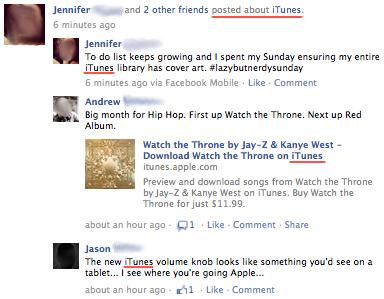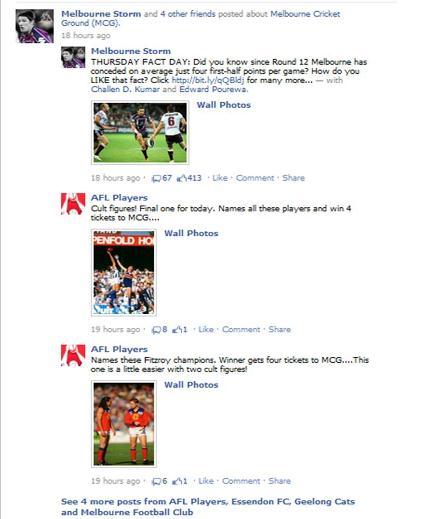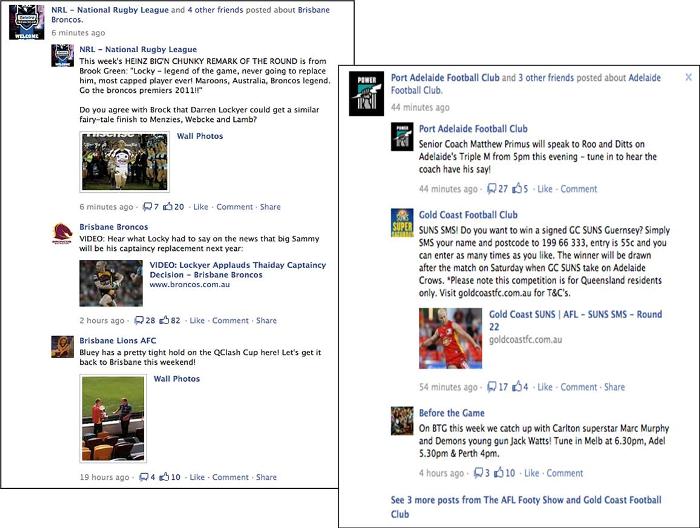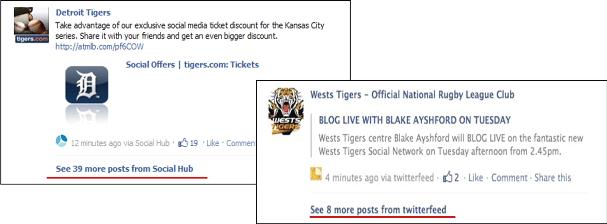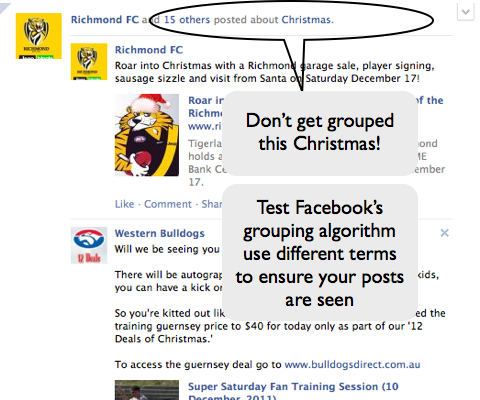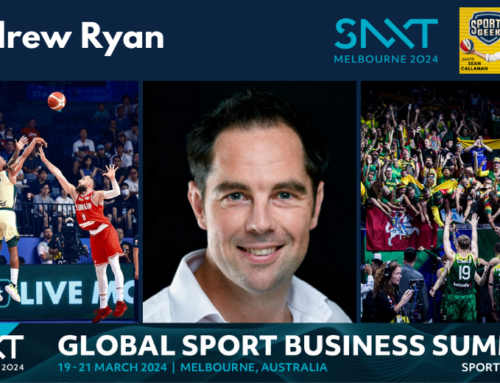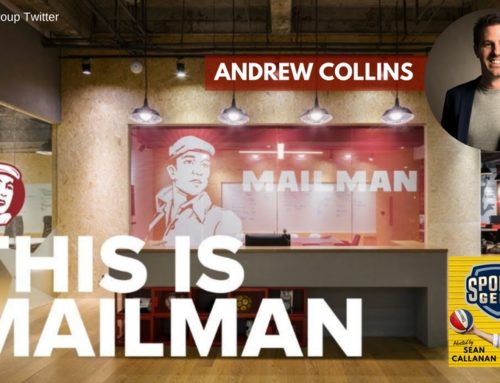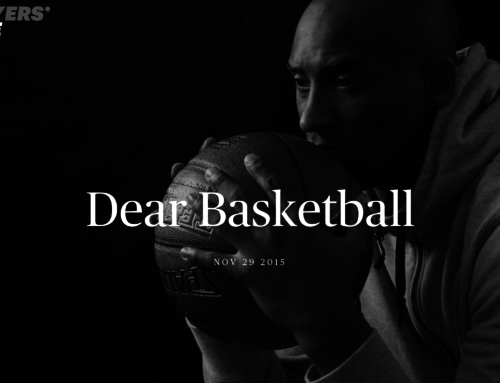Guest post from Daniel Pinne (@cushion09) – a member of @SportsGeekDI program
You might have noticed a fortnight ago that your newsfeed in Facebook has changed slightly. It’s part of Facebook’s move to group similar stories together, they call it ‘Aggregated Topic Clusters’. It uses keywords in your friends and/or pages posts then groups them together and provides links to the pages on that topic, whether your friends tagged the page or not. Furthermore, if the topic doesn’t have a page on Facebook, it will link to the Wikipedia page for more information. (sometimes this doesn’t work though and will link to the incorrect page)
The new move uses ‘Natural Language Processing’ to examine the key words in the posts which ultimately determines what will be grouped together. It doesn’t however, have the ability to detect sentiment, sarcasm or cynicism which can sometimes result in some unsavoury or incorrect grouping of posts.
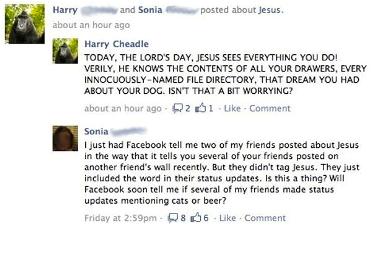 There’s been plenty reported and blogged about since the change and it’s been met with a fair bit of criticism from users, particularly those that play games on Facebook.
There’s been plenty reported and blogged about since the change and it’s been met with a fair bit of criticism from users, particularly those that play games on Facebook.
At SportsGeekHQ we’ve been keeping a close eye on this newsfeed change and we’ve come across quite a few glitches that could potentially have a major effect on the way sports teams engage with their fans. The 2 major issues we’ve found are:
- Grouping posts that are based on incorrect information, old/expired pages or linking to the incorrect fan page; and
- Grouping un-related posts by the 3rd party application tools that were used to post the information (eg Hootsuite, Tweetdeck, rss.graffitti)
1. Grouping incorrect information
When the weekend rolls around there are plenty of posts by sports teams and the media and it increases the chances that the new Facebook newsfeed algorithm might not get it quite right. Take the below post as an example that has linked to the MCG, yet none of the posts were directly about the ground. Further to that, it’s hidden posts from 3 other AFL clubs – they weren’t about the MCG either.
Here is another example where it has gotten it just plain wrong, I’m not sure that the teams in these relevant cities would be posting too much content about their opposition?
We’ve come across several other examples including links to a venue that doesn’t exist anymore and others with links to Wikipedia pages rather than fan pages. Have you come across any interesting ones? Tweet a screen shot to me @cushion09.
Some businesses will welcome this change as it drives more traffic towards their pages as more people post about their product. It could be seen as Facebook’s attempt at battling the ‘trending’ feature on Twitter.
But as the examples show above, sometimes it could have a detrimental effect for a sporting team and there are a few lessons sporting bodies can take out of it.
What can we learn?
- Always try to tag the information that you’re referring to in your posts (using the @feature to the official Facebook page). By tagging the venue/team/product in your post, it will help Facebook determine the exact nature of your post and will also search for other similar posts in users feeds to link to that information – a win/win for you.
- Whenever we come across the mistakes made by the algorithm, it’s usually because the post is a basic status update, without engaging content (photo, videos etc) to determine the topic. This re-enforces that sporting teams need be consistently delivering quality content to not only battle this new feature, but it will also help their rating in the ‘Top News’ feed of their fans (95% of users have defaulted to Top News in their Facebook feed) by increasing their ‘EdgeRanking’.
If you’re not quite sure what EdgeRanking is – Read more here. In a nutshell it analyses a post using 3 factors:
- Affinity – how much a user interacts with a page. This means it’s no use just having them as a fan, they need to be interacting – liking, reposting etc. – on your posts.
- Weight – the type of post. Video, photo, link, poll etc. The ranking of these is set by Facebook and what product they’d like to promote at the time, but usually video and photos are ranked highly. Poll’s are a feature that is being encouraged by Facebook at the moment.
- Time Decay – Pretty simple, how long ago the post was.
2. Grouping by 3rd Party Application Tools
When we came across this feature we were stunned at how Facebook has tried to corner it’s users in to using the native Facebook application to post their information. They’ve begun grouping posts by 3rd party applications such as Hootsuite, Twitterfeed, Tweetdeck Socialhub etc
Facebook could explain this is an attempt to help group similar posts together, but I’ve only seen it work once for a company that uses a unique application to post their information. It helped by grouping about 8 posts from the last 3 days in the one group so I could click on it and get a quick re-cap on their latest news. However, when we apply it to a sporting environment, it can have far bigger implications for a team’s post.
Take the Major League Baseball as an example. Most teams use ‘SocialHub’ to post links and information on their social media accounts. As a Sports Geek I tend to follow most teams in the MLB so I can keep a track on what the leaders in the industry are doing. I’m not sure that too many fans will follow more than their own team BUT if they did or if another sporting code were to adopt using the Social Hub tool, it would hide them under the “See X posts from Social Hub”.
Facebook are obviously trying to push people to use their native application to post your information, capitalising on their advertising and other features that 3rd party applications don’t show. This has implications for many of the external tools that digital media managers are using to streamline their work processes.
What can we learn?
- It might not be time efficient and convenient, but digital managers will have to be careful about what tools they are using to post the content. For the time being until Facebook make further changes to their newsfeed algorithm, we’d suggest logging on and using the native Facebook application for all your future posts.
- Have a quick look at what tools your competitors are using, not necessarily from the same code, but from other sports. Will your posts get listed with them? Do you tend to post information around the same time of the time day/week as them?
As Facebook try to work towards the right algorithm for their newsfeed, it’s likely there’ll be some more changes made along the way that Sports Digital Marketers will need to be on top of. These are a couple of changes that have had the most effect recently and we’ll be waiting for some more shortly.
What do you guys think? Do they have to consider other features than just topic/keyword? Should they be using more sophisticated way of grouping the related posts?
I’d love to hear any feedback on the article and the changes that Facebook have made. Connect with me on Twitter (@cushion09) or on LinkedIn – http://au.linkedin.com/in/danielpinne
Christmas Update
Sports Geek Update: If you haven't seen this grouping effect yet just try to find a post from a brand about Christmas, Facebook will be grouping all the posts like below.


